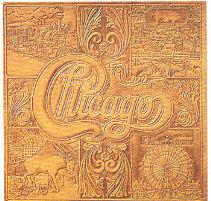|
|
 CHICAGO VII CHICAGO VII
Release Date: 1974
Cover Design: Leatherwork Scenes of Chicago History (Railroads, Stockyards, Mrs. O'Leary's Cow, and the World's Fair)
Proves Cover Theory: Yes
Becky Rating: VIII out of X
WHAT? NO POLKA?
Chicago VII is the band's most eclectic album. From straight-out jazz to acoustic folk, from salsa to funk to rock, almost every type of American popular music is represented on VII. It might be easier to list the musical styles not included on this album - classical, maybe; country, possibly; and how did a group with two Polish guys (Peter Cetera and James Pankow) manage to leave out polka????
VII was a milestone album for several reasons. It's their last double album and the last to include instrumentals. It's the first album that includes Brazilian percussionist Laudir de Oliveira as a full-fledged member of the group, and the first album to include big-name guest artists (the Pointer Sisters and the Beach Boys). It's the first album in which band members stretch out in new ways - Terry Kath plays bass, Cetera plays guitar, Pankow plays timbales, Robert Lamm plays mellotrons and ARP synthesizers, Lee Loughnane sings. They really seem like they're having a great time putting this one together. It's also, in my opinion, their most unattractive cover.
Many Chicago fans remember VII as "The Jazz Album," and for good reason - the entire first third of the album is devoted to instrumentals. The album begins with the African-inspired Prelude to Aire, a flute and percussion duet, then runs right into Aire, a fusion piece that includes a fine, subdued Terry Kath solo. Devil's Sweet is probably the only pure jazz song on the album - I don't really care for it, but those of you who like solos on "the real drums" might.
The second side opens with what sounds to our millennial ears like a modem endlessly trying to dial into the Internet - it's really Robert Lamm playing an early synthesizer on Italian from New York, yet another jazz number which segues into Pankow's instrumental Hanky Panky, which segues into the Dixieland sound of Life Saver. Ah! Vocals! Robert sounds like he's singing through a megaphone as he sings a commercial for his favorite five flavors. No, not really, it's a standard love song that runs on way too long - unlike what comes next. Of course, it's Happy Man, Cetera's acoustic masterpiece. The bass-piano-congas instrumentation, the Latin beat, the subtle but very beautiful lyrics - Peter proves that a love song doesn't have to be wimpy or sappy. If only he'd followed his own example...
Side three kicks off with a Pankow ballad, sung by Cetera, but this time the theme is one of self-discovery rather than love. The string wash doesn't work for me, and I've Been Searchin' So Long has been overplayed on lite-fm radio. But next - SALSA! Mongonucleosis is one of my favorite Chicago songs ever and wouldn't sound out of place on the next Cubanismo cd.
Terry Kath then contributes two beautiful songs with interesting lyrics. Song of the Evergreens marks Lee Loughnane's singing debut - he does, to his credit, sound like Kath with a cold. The lyrics, about the joys of winter, are not favorites of mine, and I think they're really about drugs. Try to find the drug-related words in the song - snow, high, shooting, light a fire, wine, cleanse our minds - what do you think? If it really is about winter, Kath hammers home the point by playing sleigh bells on the "snow snow snow" part.
Byblos, which follows, is Kath's best song. An acoustic folk-like tune, I didn't really understand it when I was younger, but now heading into my late 30s, I can totally relate to it. Who hasn't met someone they thought they were interested in, only to have that person fall for one of their friends instead? (The friend in the song is rumored to be Peter Cetera, by the way.)
And now it's special guest time! Everyone knows the pop tune Wishing You Were Here, but how many know that the Beach Boys sing backup on this song? The familiar theme of the traveling musician is handled well. Next is Call On Me - notable as Lee Loughnane's first songwriting credit, for a very bright music track under some typical let's-still-be-friends lyrics (yeah, I bet I can count on you. Not!), and for being the first Chicago single to feature Latin percussion prominently. Robert Lamm's Woman Dont Want to Love Me is obviously influenced by what was going on in R&B at the time, but I think it would have been even better with Terry Kath singing lead. The album closes out with the gospel-inspired Skinny Boy, the title cut for Lamm's first solo album that also appears on this album with backup vocals from the Pointer Sisters.
Chicago VII ends the first phase of Chicago's career. We won't hear any more instrumentals, serious jazz pieces, or hit singles sung by anyone other than Peter Cetera anymore.
And do you also find it ironic that an album titled "Chicago Seven" is completely non-political?
(c) 2001 Becky Banfield for Dos Gardenias Productions
Back to Chicago Album Review Index
Back to Chicago Homepage
Back to Music
Happy Cause I'm Going Home
|
|